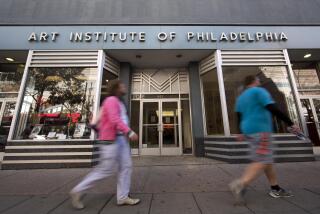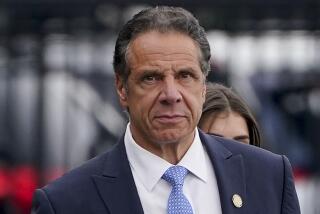College loan kickbacks are alleged
- Share via
Student loan providers are engaged in widespread illegal and deceptive practices, including kickbacks to colleges for directing students to lenders, New York Atty. Gen. Andrew Cuomo said Thursday.
A nationwide investigation by his office revealed all-expense-paid trips to luxury Caribbean resorts for college financial aid officers and their spouses as well as college call centers secretly manned by lenders, Cuomo said. He did not single out specific lenders or schools.
“A student’s first lesson in college should not be in consumer fraud,” Cuomo said. “The school-lender relationships are often for the benefit of the school at the expense of the student.”
Cuomo’s office has been probing since late last year how schools determine who to place on their so-called preferred lender lists. The attorney general, New York’s top law enforcement officer, said he requested information from six lenders, including SLM Corp., also known as Sallie Mae and the nation’s largest provider of student loans.
His office said it was investigating more than 100 colleges and universities nationwide, including Ivy League schools.
Cuomo, 49, also alleged that firms on preferred lender lists secretly agreed to sell their loans to a single lender, so students were forced to seek loans from only one source.
Cuomo alleged that unnamed lenders had been providing computers to schools and putting college officials on their boards. Lenders set up funds and credit lines for schools in exchange for being put on the preferred lender lists, he said.
No lawsuits have been filed against any lenders or colleges, though Cuomo said the practices his office uncovered violated New York state consumer protection and business laws.
Cuomo, a Democrat who took office Jan. 1, replaced Eliot Spitzer, now New York’s governor. Cuomo was sending out letters to 400 colleges Thursday, including all 300 schools in New York. The letters inform them of the alleged deceptive practices in what he described as an $85-billion-a-year student loan business. The letters were timed to come out as prospective college students apply for fall admission, Cuomo said.
“The message to the schools is very clear: Stop the deceptive practices and stop it now,” he said. “To students, learn the Latin phrase caveat emptor. Lenders might be preferred by the school at your expense.”
In addition to SLM Corp., lenders from which Cuomo’s office is seeking information include Nelnet Inc., EduCap Inc., CIT Group Inc., the College Board and Education Finance Partners.
The Senate and the Education Department also have raised concerns about agreements between colleges and the lenders they recommend to students.
Tom Joyce, a spokesman for Reston, Va.-based SLM, said the company didn’t offer schools kickbacks or financial incentives for their business. He said Sallie Mae had paid for trips for financial aid officers to attend advisory board meetings or to its service center, not to the Caribbean.
Joyce said Sallie Mae did staff school call centers, as Cuomo claimed, and that the company was paid by schools for doing so. He also said that a single lender might service other lenders on a college’s preferred lender list, as Cuomo said, but it would be at the same terms offered to the student at the outset.
“Competition has driven costs down,” Joyce said. “The private sector today provides lower-cost loans than the government-run federal direct lending program.”
CIT said it received a letter from Cuomo’s office requesting information on its student loan business.
“We have met with the attorney general’s office, are in the process of complying with the information request and are fully cooperating with the attorney general’s investigation,” New York-based CIT said.
Ben Kiser, a spokesman for Lincoln, Neb.-based Nelnet, said the company was cooperating with Cuomo’s probe and believed it had complied with the law.
Sandra Riley, a spokeswoman for the New York-based College Board, which administers the Scholastic Aptitude Test and also is a lender, said it was cooperating with Cuomo’s investigation.
“We agree students and parents should be wary of any deceptive practices that might be employed by some in the loan industry,” Riley said.
George Pappas, a spokesman for closely held EduCap, a Washington-based nonprofit, said his company marketed directly to consumers and didn’t participate in any colleges’ preferred lender lists or market through schools.
“We’ve suffered adverse effects because of these relationships,” Pappas said of the ties between colleges and other lenders. “We support what the attorney general is doing.”
Kirk Copeland, a spokesman for San Francisco-based Education Finance Partners, didn’t return a call seeking comment.
More to Read
Sign up for Essential California
The most important California stories and recommendations in your inbox every morning.
You may occasionally receive promotional content from the Los Angeles Times.










